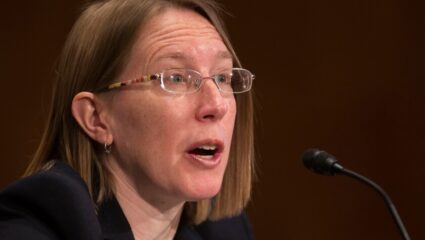
With a major transition in the country’s presidential administration, a shifting U.S. regulatory landscape has become a key talking point in recent weeks. That conversation has been especially focused on regulatory bodies with influence over companies’ dealings with corporate governance and climate change, such as the SEC.
The SEC has been criticized by some as being too easy on corporations on climate change and other matters despite pursuing more enforcements and financial remedies than in the four years before it came under the watch of President Donald Trump appointee Jay Clayton, who announced Monday he was stepping down as head of the agency.
“Personnel is policy, and to a large extent what the SEC focuses on will depend on who the chair is,” Council of Institutional Investors executive director Amy Borrus said on a Thursday, Nov. 19, webcast panel during The Deal’s Corporate Governance virtual event. “So think about all that President-elect Biden has said about tackling climate change risks, and public statements on the subject by at least two current SEC commissioners. I would expect the SEC to impose rules for mandatory corporate disclosures of climate change risk.”
Borrus admitted major climate change enforcement is controversial on Wall Street, as are CEO pay and boardroom diversity disclosures. But she said there is lower hanging fruit for Biden’s administration to go after with its SEC appointments.
“Some relatively early wins are the hangovers from Dodd Frank and the clawback rule, which the SEC proposed back in 2015, and is largely consistent with CII policies,” she said. “We don’t see why we should still be waiting on this rule.”
Others on the panel agreed with Borrus’ cautious view toward future SEC initiatives on climate change.
“Historically, the SEC has approached climate change disclosure from a very traditional point of view, which is materiality based, principles-based,” Debevoise & Plimpton LLP partner William Regner said. “And I think it’s just a real challenge in dealing with this, systemic in nature.”
Though some did make further arguments for stronger climate change related policies, including interim managing investment director of CalPERS’s board governance and sustainability unit Anne Simpson.
“I think the climate risk disclosure is long overdue, and in fact, I think we’re moving toward consensus,” she said during the webcast. “Rising greenhouse emissions are coming to contribute to global warming — this is science now, we’re not in the world of magic now or tomfoolery. It’s going to have, and is already having, physical effects, which are causing damage to our assets that we hold.”
What may ultimately push the SEC toward making firm rulings on the subject of climate change is how they look at its effects on assets, Regner explained.
“There may not be, through a conventional lens of materiality, a huge impact on the individual company, but it definitely has a huge impact collectively, and large asset managers looking to foster portfolios obviously see the risk that’s represented by climate change,” he said. “And I think that’s going to drive toward some form of more standardized disclosure on the topic.”
But beyond those goals viewed as more progressive by the broader investment community, many are still focused heavily on succeeding in initiatives they’ve only started to see some progress in recent years, including improving diversity in corporate governance.
“CalPERS is a $400 billion pension fund, and we rely on investment returns for something like 60 cents on every dollar,” Simpson said. “So when we’re talking about corporate governance and regulatory effectiveness, this really matters to the more than 2 million people who are in our pension fund. And I think that’s true of every single person in the financial market out there. There are many, many, many families and communities relying on the capital markets to work so governance is an absolutely fundamental issue for us.”
Simpson also pointed to a Credit Suisse Group study that may serve to illuminate just how much diversity in the boardroom and C-suite could be worth to those with their financial well-being invested in the market.
“Those companies where a member of the board or a senior executive felt comfortable enough to be public about their sexual orientation, that was associated with higher performance,” she said. “So it very well may be that the highest performing companies get this, and they want the best talent; and they’re not confining themselves to a tiny minority group.”
That minority group happens to be white men over 60 years old.
“We need to expand that along dimensions of gender, race, ethnicity, considerations on disability,” Simpson added. “Age is highly relevant, but so is gender identity, so is sexual orientation. If the pool of talent out there in the society that we’re in is varied, and varied in talent, and companies are serving very varied and diverse communities, they’ve got to have a leadership, which reflects that.”
Editor’s note: The original version of this article was published earlier on The Deal’s premium subscription website. For access, log in to TheDeal.com or use the form below to request a free trial.



